Verdict
It’s undoubtedly a bit odd but Audio Technica’s updated Sound Burger genuinely allows for vinyl playback on the move and is probably the most compelling Bluetooth turntable you can buy. Throw in respectable wired performance and there’s a lot to like.
Pros
- Sounds consistently enjoyable
- Truly charming industrial design
- Well-made and usefully compact
Cons
- Bluetooth pairing is fiddly
- Some aspects of the design are quirky
- More conventional turntables can outperform it
-
Playback speedsPortable turntable with 33 and 45RPM playback -
ConnectivityBluetooth and wired outputs -
Phono stageBuilt in phono stage
Introduction
Audio Technica is best known as a builder of very talented phono cartridges and headphones, but the company isn’t afraid of trying different things when they feel so inclined.
Way back in 1983, they decided that portable cassette players sounded a bit feeble and launched the AT-770 and also gave it a name; two to be exact. In the US, it was called Mister Disc but in the rest of the world it rejoiced in the name Sound Burger.
You probably won’t be too surprised to hear that the general public weren’t completely convinced by the idea and, after a few years on sale, it was discontinued. The premise was sufficiently cool though that the Sound Burger became something of a cult classic in the intervening years.
As a result, when Audio Technica celebrated their 60th anniversary, they decided to produce a limited run of Sound Burgers. This being the 21st century, the new models were updated to include USB charging and Bluetooth. The reception for the updated Sound Burger was wildly enthusiastic and they sold through in a month.
Suitably encouraged, Audio Technica has re (re) released the Sound Burger; now sporting the model number AT-SB727 as a permanent model in the range. This is a lovely redemption arc but how does the Sound Burger hold up in 2024? Is this a genuinely useful object or a bit of nostalgia that should have stayed in the eighties?
Availability
The AT-SB727 is available from the Audio Technica website for £199.95. In the US it retails for $199.95 and in Australia it can be found for $400 AUD. Something to bear in mind is that the Sound Burger re-launched first as the AT-SB2022, and these models can also be found for sale through resellers.
These command a premium as they were a limited edition and red ones especially are rather sought after. This also applies to yellow versions of the current AT-SB727 which were available at launch but are currently out of stock.
The Sound Burger is – let’s be honest for a moment – rather niche. You can buy turntables from a few different companies for £200 but ones that work on battery and stow into the shape and size that the AT-SB727 does are rather thinner on the ground. If you genuinely want a portable Bluetooth turntable, this is pretty much the only game in town.
Design
- Compact Chassis
- Belt Drive
- Unique solutions to use on the move
The AT-SB727 is belt driven turntable that alters the motor and and arm geometry so that when no record is present, the whole assembly stows in a narrow housing that can be carried in a bag and does genuinely warrant the term ‘portable’ (whether the stack of records you’d also need to carry deserves the same description is something I leave to you to decide).
Some aspects of this packaging are genuinely clever. There’s no on and off switch for example as the arm simply clicks into a recess at the end of its travel to keep it off the record when you change it which also cuts the motor out. As the belt is a point of wear, there are two tiny trim pots on the underside to ensure that you can ensure it always spins at the correct speed.
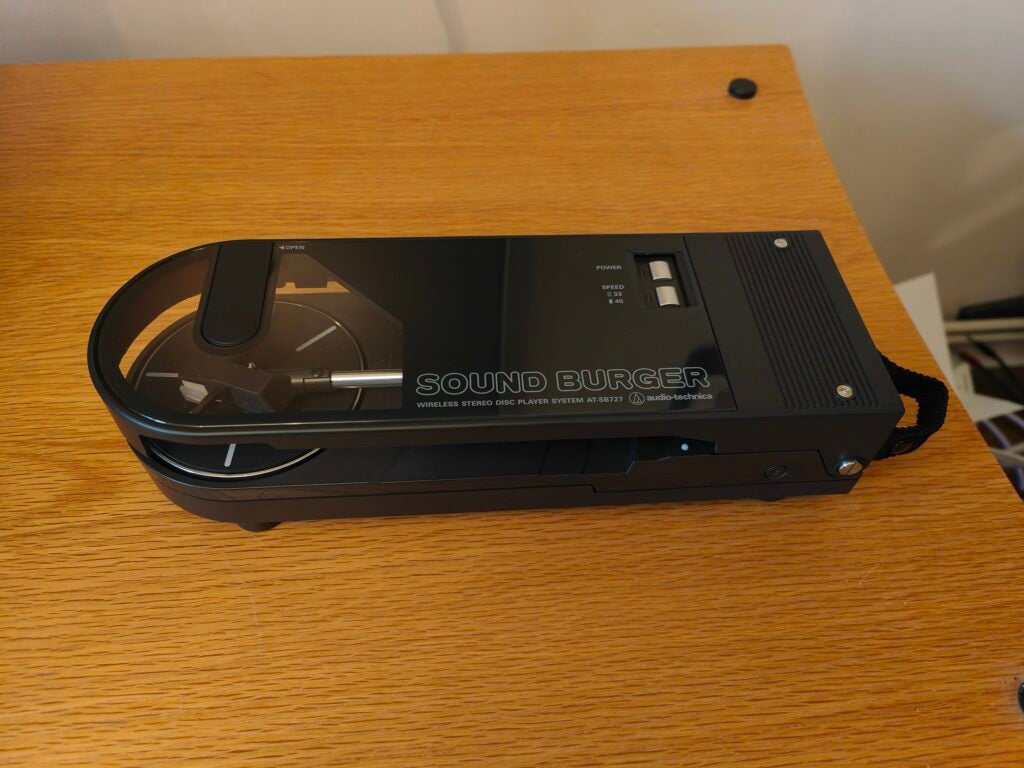
Less brilliant is the transit screw that should be fitted when the Sound Burger moves any great distance. As this comes away completely from the unit (rather than being on a retainer or stay), I’ll wager most are lost in the first week.
Open the clamshell lid and you’ll find a 90mm aluminium platter. This can play at 33 and 45 RPM and, regardless of the size of the record you elect to play on it, the record will overhang both the platter and chassis, sitting in free space. To ensure that the record is held in place, a rubber adapter is placed on top of the record which mates to an upper spindle when the lid is shut.
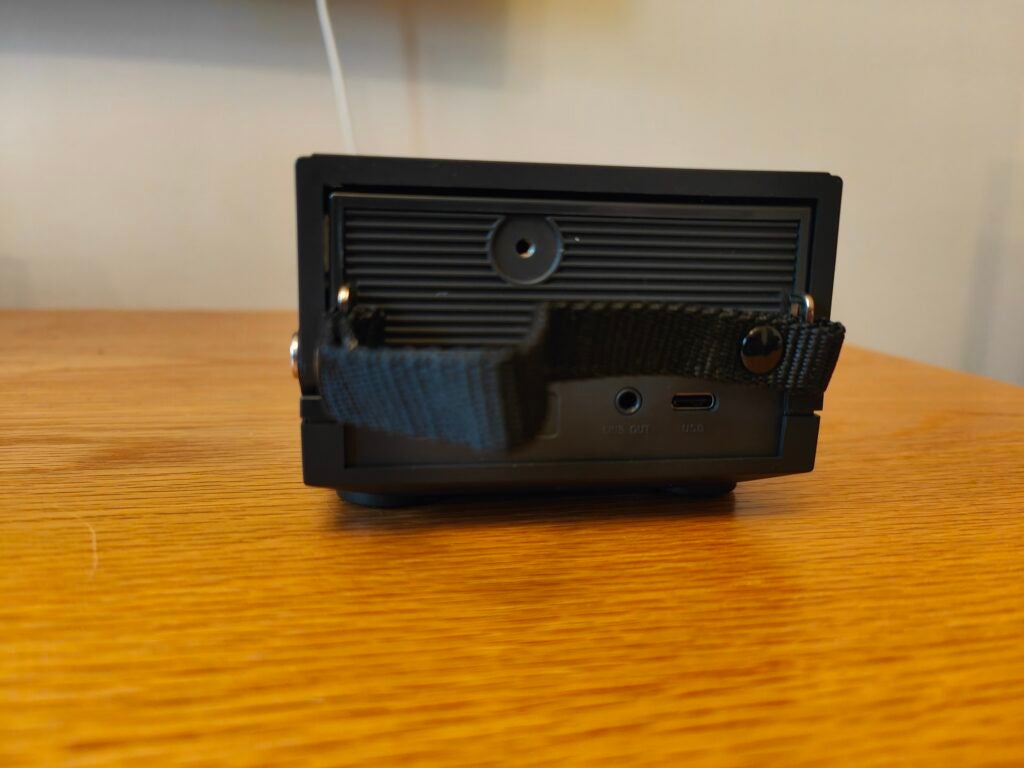
It’s important to mention that the Audio Technica needs to be on a flat surface to work and can’t be played on the move. A significant update for the new model is the old C batteries are gone and in their place is more modern lithium-Ion battery that charges (rather slowly it has to be said) via USB-C. Audio Technica claims a battery life of 12 hours and this feels achievable in use.
Audio Technica hasn’t tinkered with the aesthetic of the Sound Burger and what results is unquestionably characterful and, once it’s got a record in it in particular, cool in a way that simply selecting a Spotify playlist won’t ever be. It also feels surprisingly solid given the relatively low price and need for it to be portable. It’s a clever and appealing thing.
Features
- 3.5mm analogue out
- Bluetooth 5.0 output
- Electronic speed control
The original Sound Burger connected to the outside world via a 3.5mm socket that was amplified by an internal phono stage. This is retained in the updated version and Audio Technica also supplies a 3.5mm to RCA cable to connect it. New for the 21st century models is a Bluetooth 5.2 transmitter that can send content wireless to a suitable receiver (not at the same time as wired connection though).
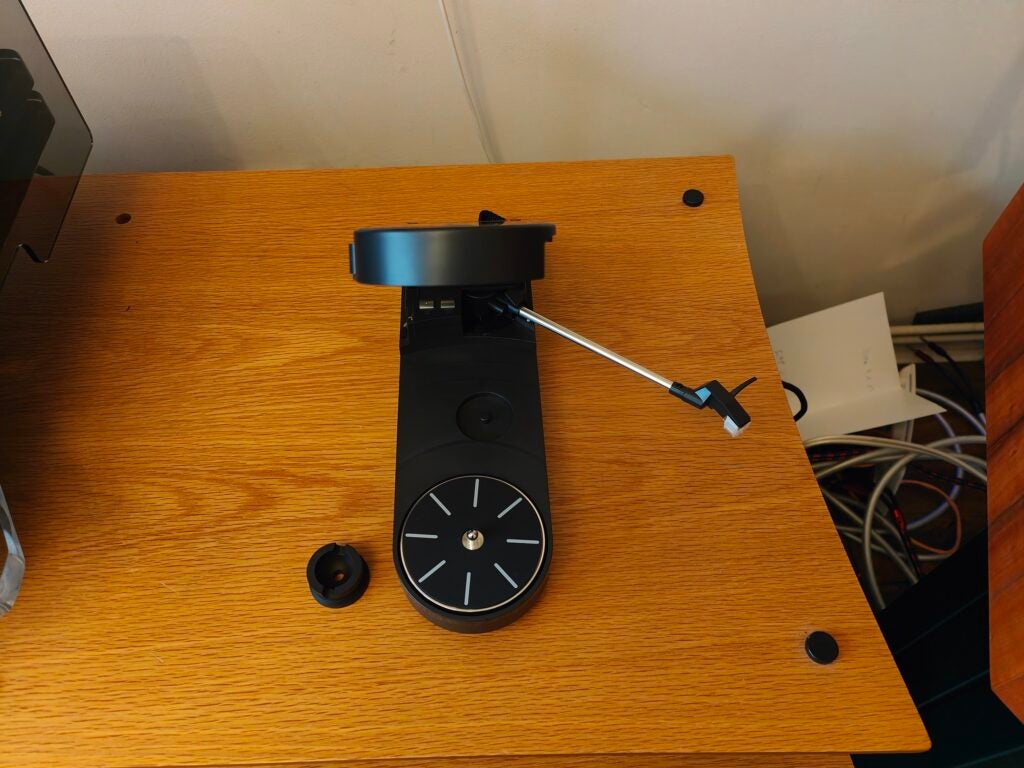
Getting this to pair is a bit of a mixed bag. The review sample wasn’t keen to talk to a pair of Philips Fidelio L4 wireless cans but instantly got up and running with a JBL Authentics 300 speaker. As Audio Technica hasn’t really altered the mechanical design, you don’t get many clues as to what the Bluetooth is up to which makes this trickier than it needs to be. Something that is also a little disappointing is the absence of any high bandwidth encoding on the Bluetooth; SBC is your lot.
One aspect of the design that is important to mention about both these outputs is that the Sound Burger has no volume control. Any level adjustment you make to the sound has to be done via the connected device so, if you are eyeing this up for use with wireless headphones, make sure you can adjust the volume on them otherwise your only options will be off or max which I suspect would get wearing pretty quickly.
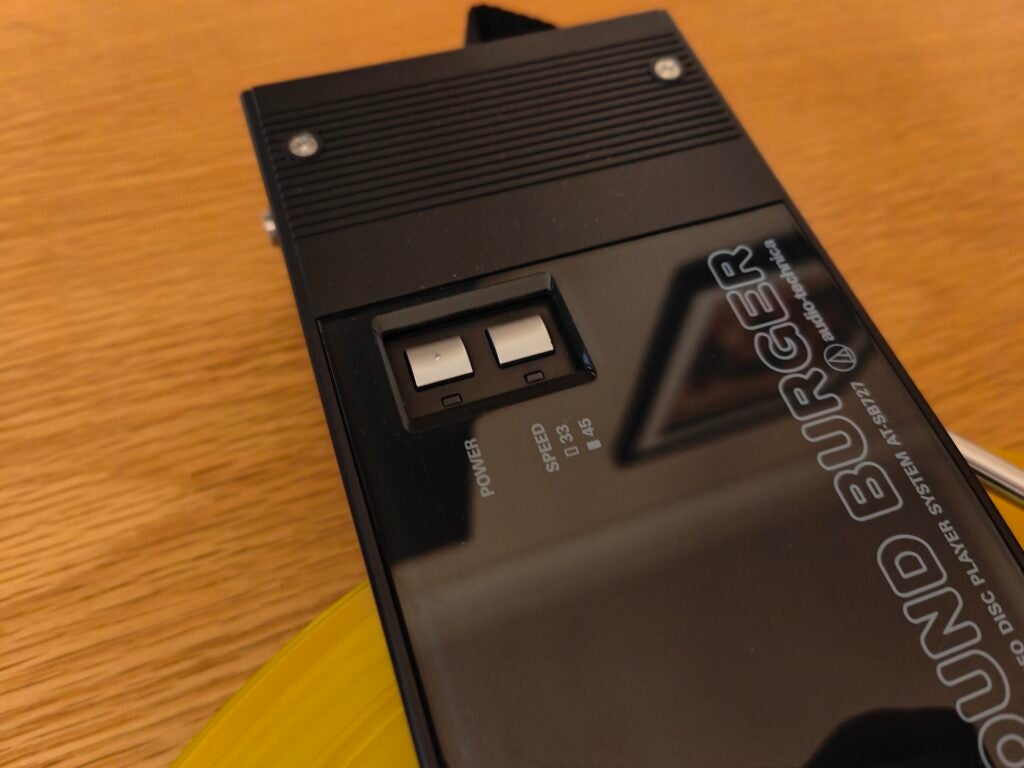
Something that the Sound Burger has retained from the original which isn’t a given at this price is electronic speed control. It will happily play 33 and 45rpm records at the push of a button (and the rubber adapter can handle large cutout 45s as well. The stylus is a ATN3600L which is the business end of the AT-91 cart and easy enough to secure replacements for as well. Living with the Sound Burger day-to-day is usefully painless.
Sound Quality
- Energetic sound
- Sounds best with wireless speakers
- Not the biggest bass performance
It takes a little bit of time for the joy you feel that the Sound Burger works at all to wear off before you can make much in the way of an objective evaluation about the way it sounds. When it’s running, the sheer unlikeliness of its design is enough to win a fair few hearts and minds. The interesting thing is though, once the novelty wears off, the Audio Technica actually does a fair bit to impress.
For a significant amount of testing, the sample was connected to a Moon 641 integrated amp which is a brisk fifty-five times the price of a Sound Burger and extremely revealing. Even so, the Audio Technica gives a good account of itself. There’s more underlying noise than with more high-end designs but once it’s up and running with Knowledge, Freedom, Power by the Slow Readers Club it manages to get all the basics right.
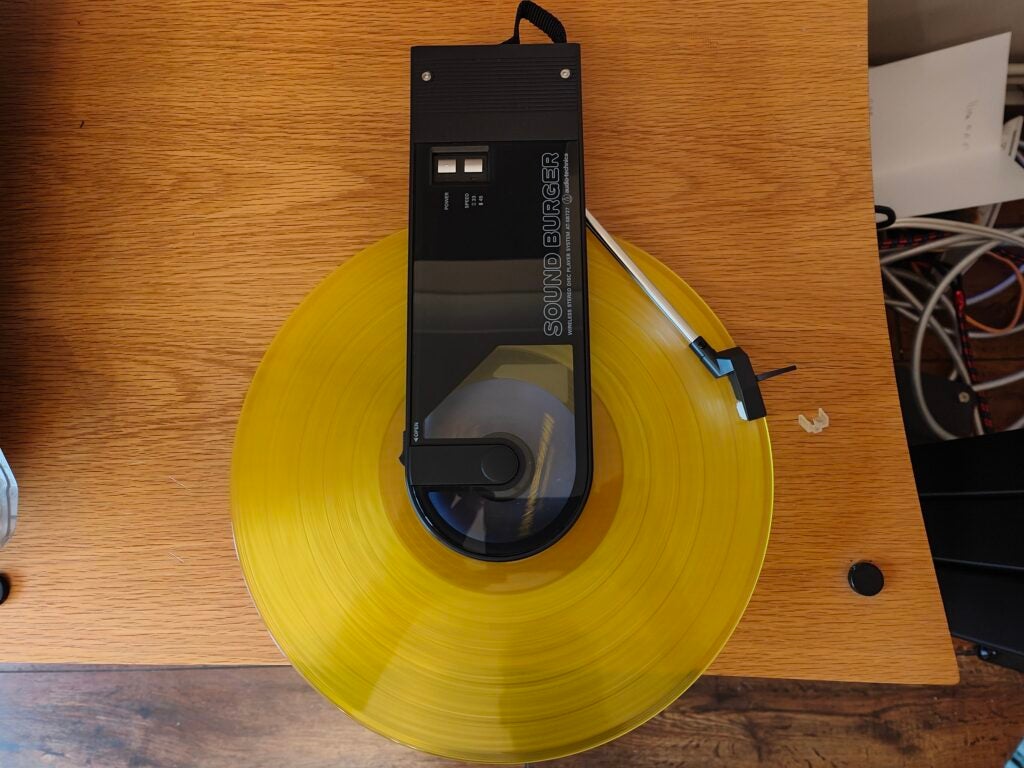
This is an energetic sounding device that does a neat job of delivering the rhythmic force and passion in this collection of songs. Bass extension isn’t seismic, but it has commendable speed and agility to it. If the music has the means to get your head nodding, the Audio Technica will likely get you nodding along to it.
The upper registers are pretty good too. Listen to the Sound Burger side by side with the dedicated (and rather pricier) home turntables that live here, you become aware that there is fine detail in recordings like Fink Meets the Royal Concertgebouw Orchestra that the Sound Burger isn’t finding and the top end is a little harder but it’s never anything other than engaging to listen to.
Over Bluetooth into a suitable speaker though, the Sound Burger truly shines. Yes, it would be nice if it had aptX and a fraction more gain wouldn’t go amiss either but, listening to Dr John’s Right Place, Wrong Time via the JBL Authentics 300 without a wire in sight is joyous in a way that largely transcends typical hi-fi considerations.
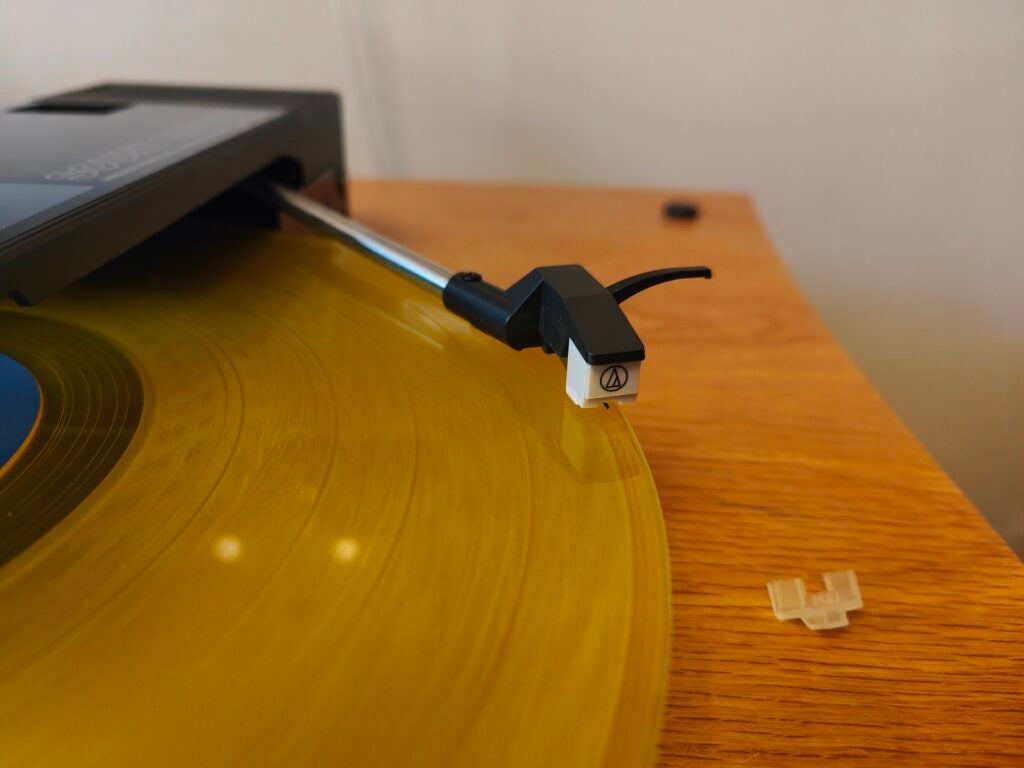
If you do concentrate on the actual performance rather than getting lost in the moment, it’s interesting to note that the slightly bass heavy presentation of the JBL (shared with a few speakers of this type) is absolutely perfect for giving the Sound Burger a little extra low-end weight. Connection on test has been stable and the two devices have dutifully paired each time.
The only area where the Sound Burger has fallen slightly short of expectations is used with Bluetooth headphones. Notwithstanding it fought pairing with the Philips every step of the way, that underlying noise level that ceases to be an issue through normal speakers is more of an issue with normal headphones. It works (and you’d certainly get some looks on public transport) but it’s realistically the weakest area of the Audio Technica’s performance.
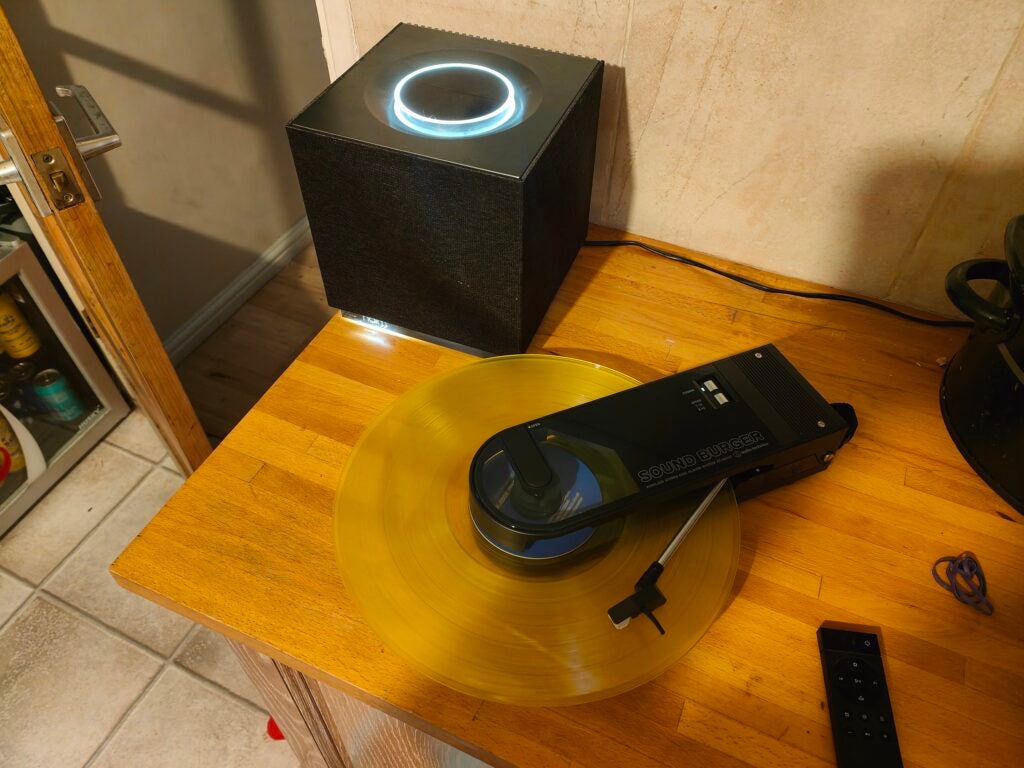
Latest deals
Should you buy it?
Too cool for school
For some of you reading this (and, if I’m honest for a moment, me too), the Sound Burger is sufficiently good at appealing to the heart that the head doesn’t get a look in. If you want to be the centre of attention on your next day trip out, the Sound Burger knocks pretty much everything else into a cocked hat. The fact it’s actually halfway decent to live with is a bonus.
The devil’s in the details
As a gently updated forty-year-old design, the Sound Burger does a few things that might annoy you. The limited Bluetooth fitment and fiddly pairing can be irritants and things like the transit screw and slow charging are things that could possibly have been done better with a heavier refresh. If you don’t need a portable turntable, more capable designs are available at this price too.
Final Thoughts
The Sound Burger wasn’t something that everyone needed back in 1983 and it certainly isn’t now but it’s such a charming thing that many people will overlook whether they need it and plump for one. If you do, it’s a genuinely enjoyable thing used at home and on the move.
How we test
We test every turntable we review thoroughly over an extended period of time. We use industry standard tests to compare features properly. We’ll always tell you what we find. We never, ever, accept money to review a product.
Find out more about how we test in our ethics policy.
Tested with real world use
FAQs
You can get the Sound Burger in black, white, or yellow versions.
Verdict
It’s undoubtedly a bit odd but Audio Technica’s updated Sound Burger genuinely allows for vinyl playback on the move and is probably the most compelling Bluetooth turntable you can buy. Throw in respectable wired performance and there’s a lot to like.
Pros
- Sounds consistently enjoyable
- Truly charming industrial design
- Well-made and usefully compact
Cons
- Bluetooth pairing is fiddly
- Some aspects of the design are quirky
- More conventional turntables can outperform it
-
Playback speedsPortable turntable with 33 and 45RPM playback -
ConnectivityBluetooth and wired outputs -
Phono stageBuilt in phono stage
Introduction
Audio Technica is best known as a builder of very talented phono cartridges and headphones, but the company isn’t afraid of trying different things when they feel so inclined.
Way back in 1983, they decided that portable cassette players sounded a bit feeble and launched the AT-770 and also gave it a name; two to be exact. In the US, it was called Mister Disc but in the rest of the world it rejoiced in the name Sound Burger.
You probably won’t be too surprised to hear that the general public weren’t completely convinced by the idea and, after a few years on sale, it was discontinued. The premise was sufficiently cool though that the Sound Burger became something of a cult classic in the intervening years.
As a result, when Audio Technica celebrated their 60th anniversary, they decided to produce a limited run of Sound Burgers. This being the 21st century, the new models were updated to include USB charging and Bluetooth. The reception for the updated Sound Burger was wildly enthusiastic and they sold through in a month.
Suitably encouraged, Audio Technica has re (re) released the Sound Burger; now sporting the model number AT-SB727 as a permanent model in the range. This is a lovely redemption arc but how does the Sound Burger hold up in 2024? Is this a genuinely useful object or a bit of nostalgia that should have stayed in the eighties?
Availability
The AT-SB727 is available from the Audio Technica website for £199.95. In the US it retails for $199.95 and in Australia it can be found for $400 AUD. Something to bear in mind is that the Sound Burger re-launched first as the AT-SB2022, and these models can also be found for sale through resellers.
These command a premium as they were a limited edition and red ones especially are rather sought after. This also applies to yellow versions of the current AT-SB727 which were available at launch but are currently out of stock.
The Sound Burger is – let’s be honest for a moment – rather niche. You can buy turntables from a few different companies for £200 but ones that work on battery and stow into the shape and size that the AT-SB727 does are rather thinner on the ground. If you genuinely want a portable Bluetooth turntable, this is pretty much the only game in town.
Design
- Compact Chassis
- Belt Drive
- Unique solutions to use on the move
The AT-SB727 is belt driven turntable that alters the motor and and arm geometry so that when no record is present, the whole assembly stows in a narrow housing that can be carried in a bag and does genuinely warrant the term ‘portable’ (whether the stack of records you’d also need to carry deserves the same description is something I leave to you to decide).
Some aspects of this packaging are genuinely clever. There’s no on and off switch for example as the arm simply clicks into a recess at the end of its travel to keep it off the record when you change it which also cuts the motor out. As the belt is a point of wear, there are two tiny trim pots on the underside to ensure that you can ensure it always spins at the correct speed.

Less brilliant is the transit screw that should be fitted when the Sound Burger moves any great distance. As this comes away completely from the unit (rather than being on a retainer or stay), I’ll wager most are lost in the first week.
Open the clamshell lid and you’ll find a 90mm aluminium platter. This can play at 33 and 45 RPM and, regardless of the size of the record you elect to play on it, the record will overhang both the platter and chassis, sitting in free space. To ensure that the record is held in place, a rubber adapter is placed on top of the record which mates to an upper spindle when the lid is shut.

It’s important to mention that the Audio Technica needs to be on a flat surface to work and can’t be played on the move. A significant update for the new model is the old C batteries are gone and in their place is more modern lithium-Ion battery that charges (rather slowly it has to be said) via USB-C. Audio Technica claims a battery life of 12 hours and this feels achievable in use.
Audio Technica hasn’t tinkered with the aesthetic of the Sound Burger and what results is unquestionably characterful and, once it’s got a record in it in particular, cool in a way that simply selecting a Spotify playlist won’t ever be. It also feels surprisingly solid given the relatively low price and need for it to be portable. It’s a clever and appealing thing.
Features
- 3.5mm analogue out
- Bluetooth 5.0 output
- Electronic speed control
The original Sound Burger connected to the outside world via a 3.5mm socket that was amplified by an internal phono stage. This is retained in the updated version and Audio Technica also supplies a 3.5mm to RCA cable to connect it. New for the 21st century models is a Bluetooth 5.2 transmitter that can send content wireless to a suitable receiver (not at the same time as wired connection though).

Getting this to pair is a bit of a mixed bag. The review sample wasn’t keen to talk to a pair of Philips Fidelio L4 wireless cans but instantly got up and running with a JBL Authentics 300 speaker. As Audio Technica hasn’t really altered the mechanical design, you don’t get many clues as to what the Bluetooth is up to which makes this trickier than it needs to be. Something that is also a little disappointing is the absence of any high bandwidth encoding on the Bluetooth; SBC is your lot.
One aspect of the design that is important to mention about both these outputs is that the Sound Burger has no volume control. Any level adjustment you make to the sound has to be done via the connected device so, if you are eyeing this up for use with wireless headphones, make sure you can adjust the volume on them otherwise your only options will be off or max which I suspect would get wearing pretty quickly.

Something that the Sound Burger has retained from the original which isn’t a given at this price is electronic speed control. It will happily play 33 and 45rpm records at the push of a button (and the rubber adapter can handle large cutout 45s as well. The stylus is a ATN3600L which is the business end of the AT-91 cart and easy enough to secure replacements for as well. Living with the Sound Burger day-to-day is usefully painless.
Sound Quality
- Energetic sound
- Sounds best with wireless speakers
- Not the biggest bass performance
It takes a little bit of time for the joy you feel that the Sound Burger works at all to wear off before you can make much in the way of an objective evaluation about the way it sounds. When it’s running, the sheer unlikeliness of its design is enough to win a fair few hearts and minds. The interesting thing is though, once the novelty wears off, the Audio Technica actually does a fair bit to impress.
For a significant amount of testing, the sample was connected to a Moon 641 integrated amp which is a brisk fifty-five times the price of a Sound Burger and extremely revealing. Even so, the Audio Technica gives a good account of itself. There’s more underlying noise than with more high-end designs but once it’s up and running with Knowledge, Freedom, Power by the Slow Readers Club it manages to get all the basics right.

This is an energetic sounding device that does a neat job of delivering the rhythmic force and passion in this collection of songs. Bass extension isn’t seismic, but it has commendable speed and agility to it. If the music has the means to get your head nodding, the Audio Technica will likely get you nodding along to it.
The upper registers are pretty good too. Listen to the Sound Burger side by side with the dedicated (and rather pricier) home turntables that live here, you become aware that there is fine detail in recordings like Fink Meets the Royal Concertgebouw Orchestra that the Sound Burger isn’t finding and the top end is a little harder but it’s never anything other than engaging to listen to.
Over Bluetooth into a suitable speaker though, the Sound Burger truly shines. Yes, it would be nice if it had aptX and a fraction more gain wouldn’t go amiss either but, listening to Dr John’s Right Place, Wrong Time via the JBL Authentics 300 without a wire in sight is joyous in a way that largely transcends typical hi-fi considerations.

If you do concentrate on the actual performance rather than getting lost in the moment, it’s interesting to note that the slightly bass heavy presentation of the JBL (shared with a few speakers of this type) is absolutely perfect for giving the Sound Burger a little extra low-end weight. Connection on test has been stable and the two devices have dutifully paired each time.
The only area where the Sound Burger has fallen slightly short of expectations is used with Bluetooth headphones. Notwithstanding it fought pairing with the Philips every step of the way, that underlying noise level that ceases to be an issue through normal speakers is more of an issue with normal headphones. It works (and you’d certainly get some looks on public transport) but it’s realistically the weakest area of the Audio Technica’s performance.

Latest deals
Should you buy it?
Too cool for school
For some of you reading this (and, if I’m honest for a moment, me too), the Sound Burger is sufficiently good at appealing to the heart that the head doesn’t get a look in. If you want to be the centre of attention on your next day trip out, the Sound Burger knocks pretty much everything else into a cocked hat. The fact it’s actually halfway decent to live with is a bonus.
The devil’s in the details
As a gently updated forty-year-old design, the Sound Burger does a few things that might annoy you. The limited Bluetooth fitment and fiddly pairing can be irritants and things like the transit screw and slow charging are things that could possibly have been done better with a heavier refresh. If you don’t need a portable turntable, more capable designs are available at this price too.
Final Thoughts
The Sound Burger wasn’t something that everyone needed back in 1983 and it certainly isn’t now but it’s such a charming thing that many people will overlook whether they need it and plump for one. If you do, it’s a genuinely enjoyable thing used at home and on the move.
How we test
We test every turntable we review thoroughly over an extended period of time. We use industry standard tests to compare features properly. We’ll always tell you what we find. We never, ever, accept money to review a product.
Find out more about how we test in our ethics policy.
Tested with real world use
FAQs
You can get the Sound Burger in black, white, or yellow versions.

























